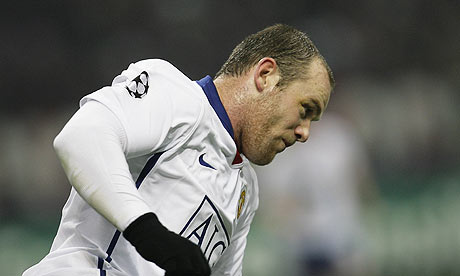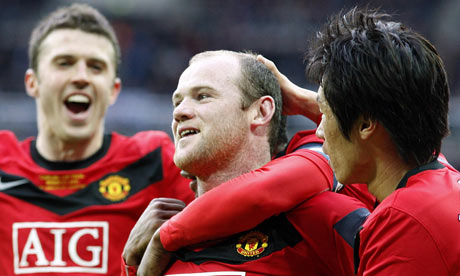United find their Carling Cup edge in Wayne Rooney
-

Wayne Rooney celebrates scoring in Manchester United's 3-2 win over Milan at San Siro. Photograph: Alberto Pellaschiar/AP
"Milan creates, Rooney destroys," is how the one leading newspaper in Italy summed up Manchester United's 3‑2 victory at San Siro last night. Corriere dello Sport felt the home side controlled the majority of the Champions League last-16 tie but, ultimately, lacked a finisher in the class of United's No10.
"Milan dominated the encounter but still suffered defeat, mainly because of Rooney, the English phenomenon," added the paper. "Milan will now have to complete an almost impossible mission at Old Trafford to go through to the next round."
That is a sentiment shared by La Gazetta dello Sport, which claimed "Milan now face a daunting challenge" to qualify for the quarter-finals of the competition.
"Manchester United, like an Italian team from another era, conquered San Siro," added La Gazetta. "They did it by beating Milan 3-‑2 in a match of contrasts: United were outplayed in the first half but then turned the tables in the second-half, mainly thanks to Rooney."
"The first challenge between 'the devils' goes to Manchester United," said Corriere della Sera. "The red devils prevailed 3-2 over the rossoneri devils, who had taken the lead through Ronaldinho after three minutes but then conceded to Paul Scholes in the first half and twice to Wayne Rooney after the interval. A late goal from [Clarence] Seedorf gives Milan some hope for the second leg."
Hope is the message also being pushed forward by La Repubblica: "Leonardo, the Milan manager, has not given up on his team's chances of progressing past Manchester United," reports the paper. Quoting the Brazilian, it added: "We can win 2‑0 in Manchester, we played well enough to have been 3‑0 up in the first half of this match."
-

Wayne Rooney is congratulated by his team-mates after putting Manchester United ahead against Aston Villa. Photograph: Nick Potts/PA
One day last week Martin O'Neill summoned his players to a meeting at Aston Villa's training ground. This was their moment, he told them. They had an opportunity to make it a season they would never forget, and it would begin by them playing the match of their lives. The door was locked and, for an hour and a half, he went round his players, telling them what he liked about each of them, why he trusted them and why they should line up against Manchester United and know they could outdo them man for man.
As inspirational speeches go, it was an epic demonstration of the man's powers of motivation. O'Neill has always had that knack of knowing what to say to get under his players' skin.
Villa played with width and penetration. They were quick to the ball, strong in the tackle and they did something that not many teams have done over the past few seasons: they made Nemanja Vidic look ordinary. Even though Sir Alex Ferguson's men had marginally more chances, the only difference really was that United had the human force of nature otherwise known as Wayne Mark Rooney.
It used to be said of Rooney that his only flaw was his heading ability, and probably with some justification given the fact he had scored only four times this way in his first 316 games as a Premier League footballer. He now has nine this season, and seven of his last eight goals have come from that freckled forehead, which is the kind of record to remind United's older supporters of Tommy Taylor, the club's equivalent of Nat Lofthouse and one of the Busby Babes to lose his life in the Munich air tragedy.
It was difficult, though, not to sympathise with Villa as the 27th cup final of Ferguson's career ended with Patrice Evra hoisting that funny three-handled trophy and the fireworks and ticker tape adding to the kaleidoscope of colour at an end of the stadium where the green and gold mingled with red, black and white. O'Neill was a picture of misery but at least he will not be tormented by the sense that his players let themselves down.
Just because they lost, it does not automatically follow that they played badly. Richard Dunne, that serial scapegoat, may find himself waking in a cold sweat after his mistake for Michael Owen's equaliser, the sort that epitomised his last season at Manchester City but that he seemed to have eradicated this campaign. That apart, however, there was plenty to admire about O'Neill's side, from the way James Milner distinguished himself in front of the watching England manager, Fabio Capello, to the wing play of Stewart Downing and Ashley Young and the latest demonstration of how the largely unsung James Collins has developed into a centre-half of distinction.
United just had that little bit extra. Michael Carrick and Darren Fletcher gradually emerged as the more authoritative midfield pairing. Dimitar Berbatov will always do something to exasperate his audience but there were some lovely moments from the Bulgarian, too, and he played a significant part in both United goals.
Antonio Valencia's penetrative right-wing runs and accurate deliveries won him the man-of-the-match champagne. As for the man of the moment, when Rooney came on for the injured Owen he set about winning the match as though he had been affronted to have been left out of the starting line-up.
As Ferguson remarked last week: "The hallmark of a truly great player is the ability to grab a game by the scruff of the neck." Rooney did just that, making sure his impact was the most important on a day when virtually everyone on the pitch contributed to one of the more enjoyable finals since the opening of the new stadium.
Or, rather, everyone but the referee. Phil Dowd made so many erratic decisions, booking players for one offence but then letting off others for almost identical infringements, he was fortunate that the players conjured up a spectacle that was engrossing enough to divert the attention from his shortcomings. For that, Villa can take their share of credit, but Rooney has something special when he can be rested from the team but still inflict all the damage.